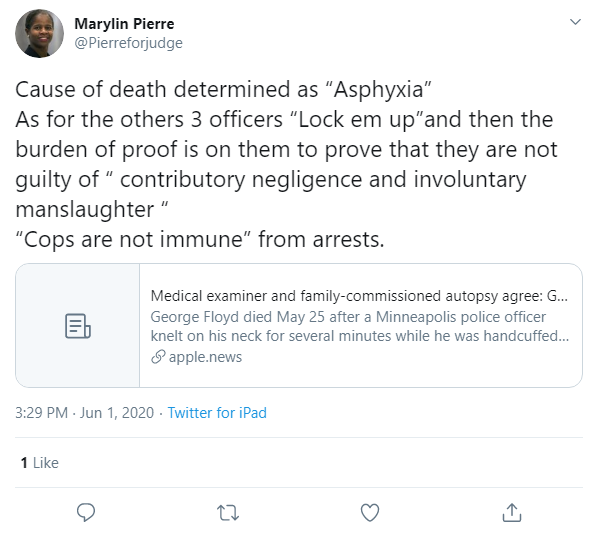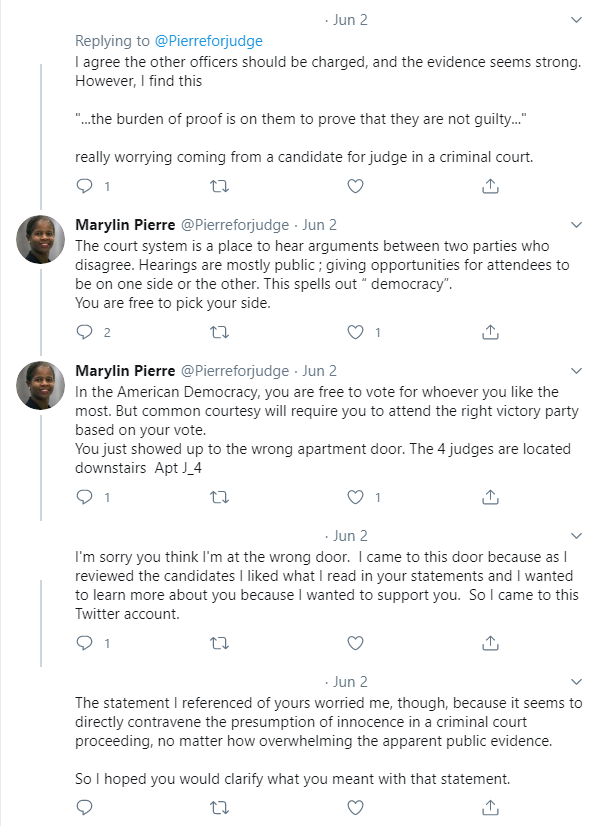By Adam Pagnucco.
Challenger Marylin Pierre, who is running against a slate of four sitting circuit court judges, will be appearing on the ballot in MoCo’s general election. If elected, she will preside over civil, family, juvenile and criminal cases for 15 years.
Circuit court judicial candidates usually don’t talk much about issues when they run like candidates for other offices do. That’s because most are vetted by judicial nominating commissions and appointed by the governor, after which they serve on the bench temporarily and must run in the next election to serve a full term. Incumbents who have gone through the vetting process claim that its thoroughness qualifies them as judges and therefore should be respected by voters. This language by MoCo’s incumbent slate is typical of how judicial incumbents make their case.
The four judges on the “Elect Sitting Judges Montgomery County Slate” – the incumbents in the upcoming election – have gone through the Judicial Nominating Commission process. The process started with a lengthy and comprehensive application covering all aspects of their education, breadth and depth of law practice, and personal background. Each judge’s application was submitted to no fewer than twelve diverse bar associations, each of which conducted its own investigation and interviews. In addition, the Bar Association of Montgomery County conducted a referendum wherein each applicant’s qualifications were subjected to a vote by every member of the bar association. The results of both the referendum and the specialty bar association interviews were provided to the Judicial Nominating Commission. The Commission then conducted its own independent investigation of all applicants and thoroughly vetted and interviewed each. A list of the most highly qualified candidates was sent by the Commission to the Governor, who interviewed and appointed the best of the best.
The Sitting Judge Principle ensures that Montgomery County has only the most qualified judges on the bench. The diverse organizations that participate in the vetting process have ensured the appointment of a bench that reflects our community. The Sitting Judges are experienced, vetted and approved.
The sitting judge slates in Anne Arundel County, Baltimore County and Prince George’s County use similar language on their websites. That’s the playbook for incumbents.
Deprived of such accreditation, challengers who fail to get through the vetting process must state their case persuasively enough to overcome that in the eyes of voters. That brings us to Pierre. In the wake of the death of Minnesota man George Floyd at the hands of police, Pierre tweeted this on June 1.

When challenged on this, Pierre had the following exchange with another person holding a different view. (I redacted the person’s identity.)

The notion that a criminal defendant bears the burden of proof at trial is inconsistent with the due process clauses of the U.S. Constitution. The U.S. Supreme Court has clarified exactly what due process means on at least two occasions. In Speiser v. Randall, 357 U. S. 513, 525-526 (1958), Justice William J. Brennan Jr. wrote for the court, “Due process commands that no man shall lose his liberty unless the Government has borne the burden of producing the evidence and convincing the factfinder of his guilt.” And in In re Winship, 397 U.S. 358, 364 (1970), Brennan wrote for the court, “Lest there remain any doubt about the constitutional stature of the reasonable-doubt standard, we explicitly hold that the Due Process Clause protects the accused against conviction except upon proof beyond a reasonable doubt of every fact necessary to constitute the crime with which he is charged.”
Pierre’s reference to “contributory negligence” is also strange. Contributory negligence is a doctrine primarily found in tort law, not criminal law, that prevents plaintiffs from recovering damages if they are at least partially at fault for their injuries even if the defendant is more at fault. Maryland is one of a handful of states that uses this doctrine but Minnesota abandoned it in 1969. What does this have to do with George Floyd’s death?
Pierre should know all about due process standards for criminal defendants. She is a graduate of Howard University Law School and the John Jay College of Criminal Justice. She has practiced law for 28 years and has a long list of professional and other qualifications. She even tweeted on May 30, “We are all presumed innocent until proven guilty.”
On June 18, 17 days after Pierre posted the “Lock em up” tweet, I emailed her asking for comment. I used an email address (MarylinForMaryland@gmail.com) to which she had replied three days before and appears on her website. I wrote:
Hello Ms. Pierre – Recently, I came across this tweet from you on the police officers who were charged with murdering George Floyd.
https://twitter.com/Pierreforjudge/status/1267538735958315008
I am thinking about writing about this but first I’d like to hear your point of view. Specifically, can you comment on how this tweet conforms with the due process rights of criminal defendants?
Adam Pagnucco
As of this writing (June 22), she has not replied. But she did delete the “Lock em up” tweet at some point after I contacted her.
And now the question falls to you. If you are a MoCo voter, do you believe Marylin Pierre should be a circuit court judge?
Update: Pierre sent me the following email three hours after this post went up. I am reprinting the email below but I am deleting the phone number she provided to protect her privacy.
Mr. Pagnucco,
The Marylin Pierre For Judge campaign has read the article you wrote about the tweet from the @PierreForJudge account. Running a campaign is so time-consuming that some of the duties have to be delegated. The Marylin Pierre For Judge campaign established some guidelines and the person running the twitter account has been diligent in following those guidelines until the tweet that you wrote about. We think that this had to do with the traumatic incident and the volunteer’s reaction to it. We have discussed the tweet with the volunteer and we went over the guidelines again.
Sometimes we are able to answer questions very quickly and sometimes we are not. We regret that we did not get a chance to respond to your inquiry before you posted the article.
If you would like to contact us, things move so quickly that you may need to call and a text at [phone number deleted by Pagnucco] instead of just sending an e-mail. Thank you for your time and attention.
Marylin
